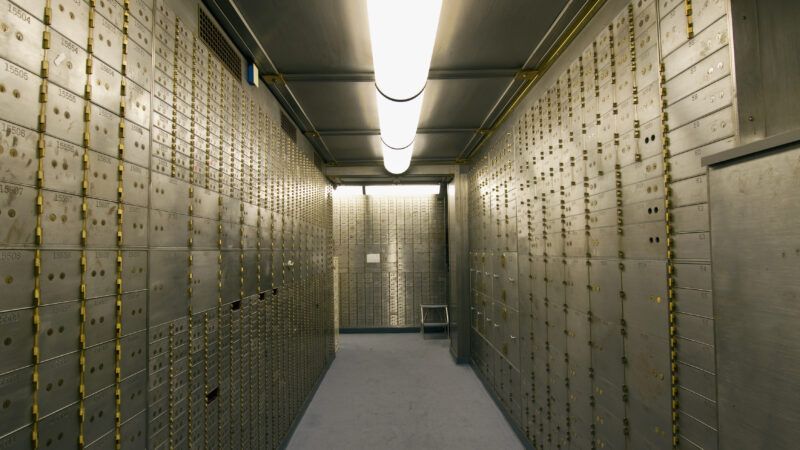Judge Orders FBI To Halt Forfeiture of Cash, Jewelry From Safe Deposit Boxes
The FBI provided "no factual basis for the seizure," Judge R. Gary Klausner wrote.

A federal judge has ordered the FBI to halt its attempted forfeiture of the contents of 369 safe deposit boxes after finding that law enforcement has provided "no factual basis" for the seizures.
The temporary injunction, issued Tuesday by U.S. District Court Judge R. Gary Klausner, is the latest blow to the FBI's attempt to seize millions of dollars in cash, jewelry, and other valuables from the safe deposit boxes once held at U.S. Private Vaults in Beverly Hills, California. When the FBI raided the facility on March 22, agents were armed with a warrant that explicitly forbade them from seizing the contents of the safe deposit boxes kept there. But the FBI took them into custody anyway, and in mid-May filed administrative forfeiture proceedings against 369 of the nearly 800 boxes seized—including more than $85 million in cash and other valuables.
The FBI contends that the contents of those boxes are the ill-gotten gains of criminal activity. Plaintiffs in the case say they've been unfairly targeted by an unlawful search and seizure that violated their Fourth Amendment and Fifth Amendment rights.
Klausner sided with the box owners on Tuesday, writing that the FBI failed to respect due process by seizing the contents of safe deposit boxes without even identifying which laws the owners supposedly broke. Instead, the FBI has tried to claim a wide range of different criminal acts, including everything from forgery to counterfeiting and smuggling to bank fraud, in order to take everything in one fell swoop.
"This list of purported statutory bases for forfeiture is anything but specific," writes Klausner, noting that the FBI cited a portion of the U.S. criminal code that includes 35 different sections. "This notice, put bluntly, provides no factual basis for the seizure of Plaintiffs' property whatsoever."
None of U.S. Private Vaults' clients have been charged with any crimes, even though the FBI has argued in court documents that "the majority of the box-holders are criminals who used USPV's anonymity to hide their ill-gotten wealth." The FBI has returned the contents from some of the seized safe deposit boxes, but only after brazenly rifling through private documents and potentially misplacing some box-holders' valuables in an apparent attempt to find evidence of criminal activity.
"Hundreds of innocent people have had their lives turned upside down by the government's $85 million cash grab," says Robert Frommer, a senior attorney with the Institute for Justice, a nonprofit libertarian law firm that is representing the four plaintiffs at the center of Tuesday's injunction. "This order squarely rejects the government's 'anemic notices' as an unconstitutional attempt to take box holders' property for no good reason."
Even though Tuesday's injunction applies directly to only four of the victims of the FBI's raid, it effectively applies to everyone caught up in the forfeiture mess, according to IJ.
"Judge Klausner's ruling is just another nail in the coffin of this ill-conceived administrative forfeiture gambit," Benjamin Gluck, a California attorney who is representing several of the other people caught up in the FBI's raid, tells Reason. "The government cannot proceed because it cannot even articulate, much less prove, why these people's property should be forfeited."


Show Comments (56)